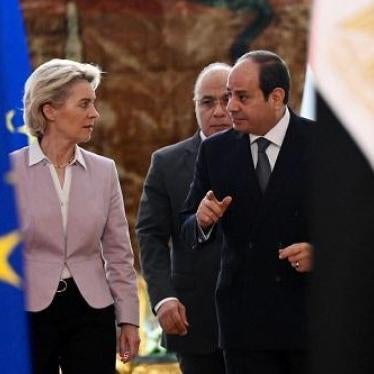Nearly three years ago, on July 30, 2021, a Libyan Coast Guard patrol boat intercepted a small vessel carrying around 20 people. The interception by Libyan officials happened despite the vessel being within Malta’s search-and-rescue area. Our investigations suggest the European Union border agency Frontex played a role in enabling the interception, but the agency has refused to share any information about it.
Today, the General Court of the EU ruled that Frontex can continue to shield itself from scrutiny for the way it conducts aerial surveillance in the Mediterranean Sea and enables such Libyan interceptions.
Sea-Watch, a sea rescue organization, filed the case to challenge Frontex’s lack of transparency. A Sea-Watch ship and their airplane, Seabird, witnessed the July 30 interception. Sea-Watch then filed a freedom of information request for all documents related to Frontex’s actions and communications that day. The agency said they had 73 documents, images, and video but would not disclose them.
Human Rights Watch also tried. As part of our reconstruction of the events that day, Human Rights Watch and Border Forensics filed 30 freedom of information requests. Frontex refused our request for information about its operations on July 30 and turned down our appeal. In response to other requests about Frontex aerial surveillance, the agency told us they had 3,092 relevant documents; they gave us 86. Many were heavily redacted.
Frontex systematically refuses access to documents, arguing it would hamper the agency’s effectiveness and public security. In its ruling on the case brought by Sea-Watch, the General Court of the EU upheld the agency’s prerogative to use this blanket justification without a requirement to provide detailed explanations. The court did find that Frontex wrongfully withheld the existence of over 100 photographs relevant to the organization’s request.
Lack of transparency undermines the public interest in holding an EU institution accountable and dramatically limits oversight by civil society. European taxpayers have a right to information about how Frontex uses aerial surveillance to enable interceptions by Libyan forces—knowing full well the arbitrary detention, violence, and exploitation people face upon return to Libya—instead of rescue and disembarkation in a place of safety.
Upon becoming Frontex director in 2023, Hans Leijtens said the agency would, “restore trust by being very transparent about what we are doing and how we are doing it.” Today’s ruling notwithstanding, restoring trust requires the agency’s leadership to allow access to information about Frontex operations, showing that EU taxpayer money is being spent on protection, not abuse.









